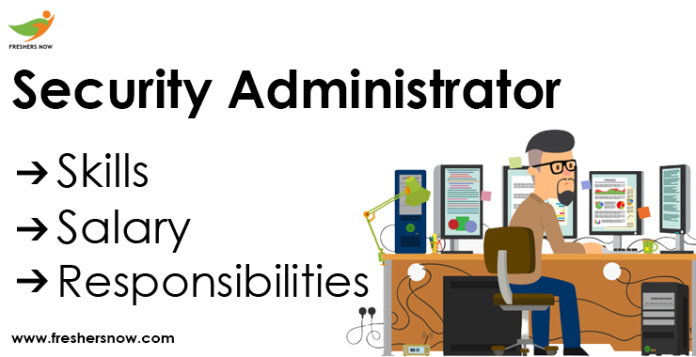
Dear users, welcome to Feshersnow.com. Do you want to develop your career as a Security Administrator? Also, looking for Security Administrator Salaries in India? If yes, this article is for you. We have provided information about Security Administrator Salary in India for Freshers and Experienced. Along with that we have also provided necessary information about Security Administrator skills, Security Administrator job roles etc.
The average salary of a Security Administrator is Rs. 598,687 per annum. Scroll down to see company-wise salaries as well as experience wise salaries of security administrators.
Who is a Security Administrator?
A security administrator is in charge of establishing and enforcing security measures over a company’s information systems and networks. Their duties typically revolve around installing and maintaining security networks, analyzing existing systems to identify areas needing improvement, conducting regular maintenance checks and upgrades to optimize services and functions, and monitoring overall systems for any suspicious activities or breaches. Furthermore, as a security administrator, it is essential to develop information technology solutions in adherence to the company’s policies and regulations, including its vision and mission.
Security Administrator Salary in India
The latest salary for a Security Administrator is ranging from a minimum of ₹503,250 to a maximum of ₹866,829. The average salary of a Security Administrator is Rs. 598,687 per annum.

Source: Payscale
What does it take to be a Security Administrator?
The company you work for is going to be the definitive answer to this requirement. If you choose to work for a small business, work experience or an associate’s degree may be accepted. Expect larger corporations with higher risk to require a bachelor’s degree in cyber security or related computer science field. A technical degree or continuing your education with a focused security master’s degree can be a great investment if you will be choosing to move into leadership roles.
What does a Security Administrator do?
Security administrators fill one of the most crucial roles in the information technology (IT) field. They take on a variety of responsibilities to ensure their organizations’ computer networks and systems remain secure. Through their work, security administrators create a safe digital environment, allowing IT personnel and other employees to work effectively.
Without proper security measures, organizations remain susceptible to cyber attacks from hackers, terrorist organizations, and foreign governments, who often aim to steal data or money. In some cases, cyber attackers infiltrate organizations’ computer networks, lock users out, and demand ransom money. Security administrators and their colleagues work to curb the threat of cyber attacks.
These professionals develop policies and systems to protect their companies’ and customers’ sensitive data. They may implement regulations to govern how information travels between employees and outside the office. Typically, security administrators work in teams to identify their networks’ weak points and install firewalls, site-blocking programs, and anti-malware software. Security administrators handle responses to unwanted intrusions, as well.
Roles and Responsibilities of a Security Administrator
- Defending systems against unauthorized access, modification, and/or destruction
- Scanning and assessing network for vulnerabilities
- Monitoring network traffic for unusual activity
- Configuring and supporting security tools such as firewalls, anti-virus software, and patch management systems
- Implementing network security policies, application security, access control, and corporate data safeguards
- Training fellow employees in security awareness and procedures
- Developing and updating business continuity and disaster recovery protocols
Factors Affecting Security Administrator Salary in India
The salary of a Business Analyst in India depends upon several factors like
- company size.
- Reputation.
- Job Position.
- Location.
- Education Qualifications.
What are the popular skills to become a Security Administrator?
- Knowledge of common protocols such as SSL, HTTP, DNS, SMTP, and IPSec
- A strong understanding of firewall technologies
- Packet shaper, load balancer, and proxy server knowledge
- Intermediate to expert intrusion detection system/intrusion prevention system knowledge
- Deep understanding of IT infrastructure, including protocols, operating systems, and networks
Security Administrator Salary in India: Based on Experience
Let’s see how a Security Administrator’s salary in India varies based on experience.
Entry-Level Security Administrator Salary in India
The average entry-level Security Administrator salary in India is ₹503,250/yr.
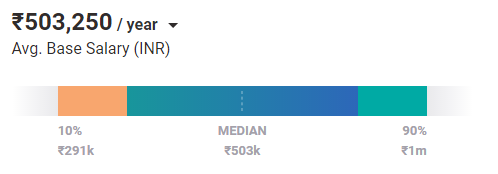
Mid-Level Security Administrator Salary in India
The average mid-level Security Administrator salary in India is ₹792,855/yr.
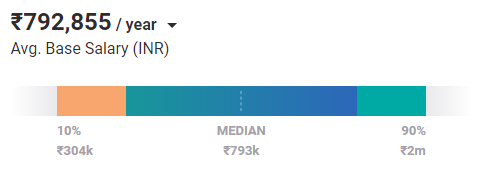
Experienced Security Administrator Salary in India
The average experienced Security Administrator salary in India is ₹866,829/yr.
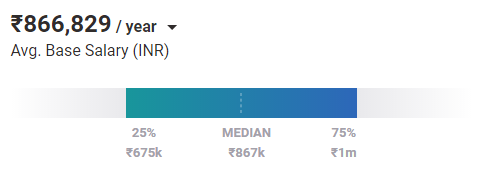
Security Administrator Salary in India: Based On Location
Average Security Administrator Salary in Bangalore, Karnataka
The average salary for a Security Administrator in Bangalore is ₹415k per year.
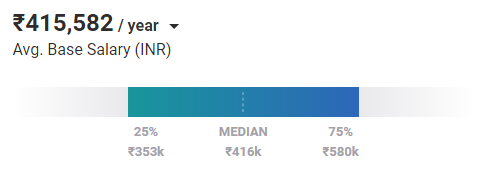
Average Security Administrator Salary in Mumbai, Maharashtra
The average salary for a Security Administrator in Mumbai is ₹443K per year.
The average salary for a Security Administrator in Chennai is ₹759K per year.

Average Security Administrator Salary in Pune, Maharastra
The average salary for a Security Administrator in Pune is ₹800K per year.
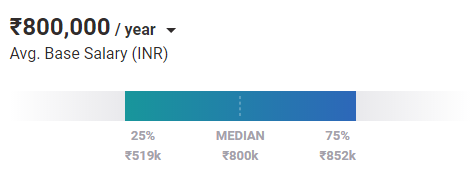
Average Security Administrator Salary in Hyderabad, Telangana
The average salary for a Security Administrator in Hyderabad is ₹450K per year.
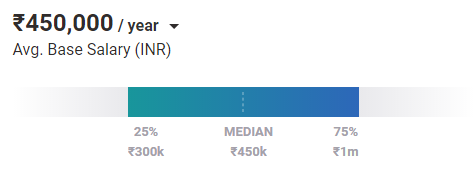
Conclusion
We hope you got the right information about “Security Administrator Salary in India for Freshers and Experienced”. To conclude, the administrator helps implement stability and security procedures regarding malware in the company’s information hardware. This can include installation, upgrading, and improvement of malware detection and prevention software across the entire company, as well as implementing policies for firewalls and site-blocking.



